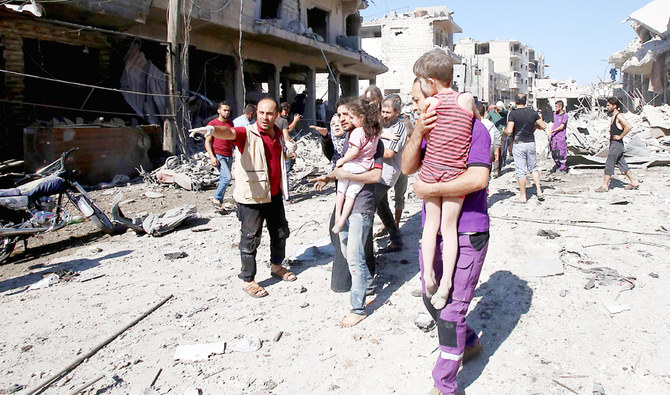MAARET AL-NUMAN/SYRIA: Regime and Russian airstrikes killed 43 people in northwest Syria on Monday, most of them in a crowded market, a war monitor said, in the latest violence to plague the opposition bastion.
In Maaret Al-Numan in Idlib province, men drenched in blood were carried away by residents and rescue workers, who used mattresses as makeshift stretchers, an AFP photographer said.
He saw the corpse of one man sprawled on the ground near a motorcycle, rubble surrounding his lifeless body.
With his eyes closed and his face covered in dust, another man clutched the arms of two people helping him out of the bombed area, the photographer added.
Thirty five civilians and two unidentified people were killed in raids that hit the vegetable market and surrounding areas in Maaret Al-Numan, according to the Syrian Observatory for Human Rights, which blamed the airstrikes on regime ally Russia.
Moscow, however, denied it was responsible, calling the reports “fake.”
“The Russian air force was not carrying out any missions in this part of Syria,” said a Defense Ministry statement.
More than 100 other people were wounded, according to the monitor, which said many of those injured were in a critical condition and people trapped under rubble.
The White Helmets rescue group said one of its volunteers was killed during the raids, raising the number of rescue workers killed since April to at least 6.
The opposition-run Idlib region, home to some 3 million people, is supposed to be protected by a months-old international truce deal, but it has come under increased bombardment by the Syrian regime and its ally Russia since late April.
The spike in violence has killed more than 650 civilians and damaged or knocked out of service two dozen health facilities.
More than 330,000 people have fled violence in the area over the past three months, according to the UN. In the Idlib town of Saraqib, another six civilians were killed in regime airstrikes on Monday, the Observatory said.
Meanwhile, retaliatory rocket fire by opposition groups killed seven civilians in the northern countryside of Hama province, state-run SANA news agency said.
Russia and opposition backer Turkey brokered an agreement in September seeking to stave off an all-out regime assault on Idlib, but the deal was never fully implemented as militants refused to withdraw from a planned buffer zone.
The Hayat Tahrir Al-Sham group in January extended its control over the region, which spans most of Idlib province as well as slivers of the adjacent provinces of Latakia, Hama, and Aleppo.
On Sunday, airstrikes on Idlib killed 18 people, including a young citizen journalist.
Anas Al-Dyab, a photographer and videographer in his early 20s, was a member of the White Helmets who also contributed to AFP. He was killed in Russian airstrikes in his hometown of Khan Sheikhun, rescuers and the Observatory said.
The Idlib region “has fast become one of most dangerous places in the world for civilians and aid workers today; a crisis within a crisis,” said David Swanson of the UN Office for the Coordination of Humanitarian Affairs.
“This violence must stop and it must stop now,” he told AFP.
In Damascus, President Bashar Assad on Monday received two Vatican cardinals who handed him a letter from Pope Francis expressing “deep concern for the humanitarian situation in Syria, especially the dramatic conditions of the civilian population in Idlib.”
Regime forces have been locked in battle with opposition fighters on the edges of the Idlib region but have failed to secure significant advances.
According to Sam Heller, an analyst at the International Crisis Group think-tank (ICG), the violence is likely to continue until “Russia and Turkey reach an agreement to calm” the frontline.
In the meantime, “each side will try to put pressure on the other through their Syrian partners on the ground” or “directly, (as) with the Russian bombing of parts of Idlib,” he added.
Syria’s war has killed a total of more than 370,000 people and displaced millions since it started in 2011 with a brutal crackdown on anti-regime protests.













